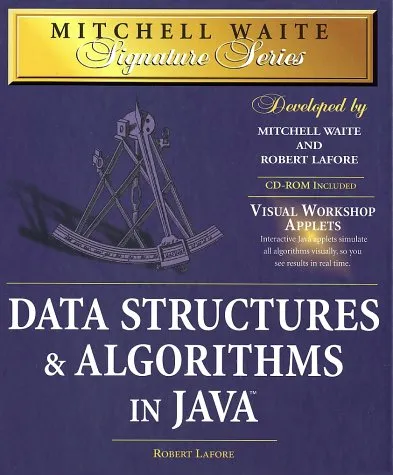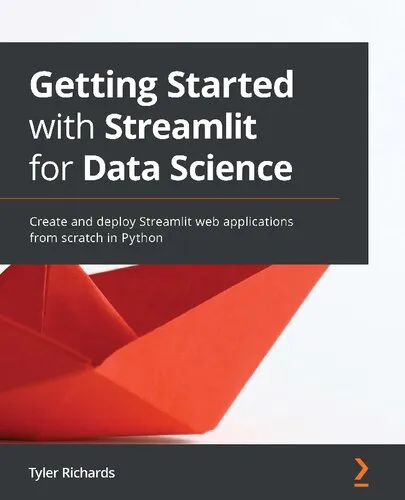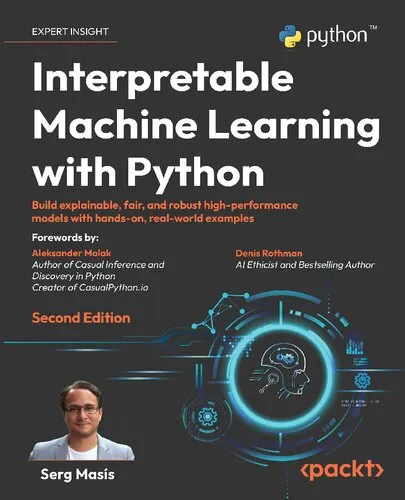Data Structures & Algorithms in Java (Mitchell Waite Signature Series)
4.8
Reviews from our users

You Can Ask your questions from this book's AI after Login
Each download or ask from book AI costs 2 points. To earn more free points, please visit the Points Guide Page and complete some valuable actions.Related Refrences:
Welcome to "Data Structures & Algorithms in Java"
"Data Structures & Algorithms in Java (Mitchell Waite Signature Series)" is an essential resource for anyone interested in mastering two core foundational topics in computer science: data structures and algorithms. Written with clarity and precision, the book is tailored for both novice programmers eager to grasp the basics and seasoned developers aiming to sharpen their skills. By focusing on the Java programming language, this book equips readers with practical and implementable knowledge applicable to modern software development.
Detailed Summary of the Book
This book serves as a comprehensive guide on the theory and application of data structures and algorithms, using Java as the vehicle of instruction. Inside, readers will find in-depth explanations of fundamental topics that drive efficient programming and better problem-solving skills. Starting with basic concepts such as arrays, strings, and lists, the book progressively covers advanced topics such as trees, heaps, graphs, and sorting algorithms.
Moreover, it places a strong emphasis on real-world implementations of these concepts, blending theoretical underpinnings with code-level examples. With its step-by-step approach, even complex topics such as recursion, dynamic programming, and hashing are made accessible.
Each chapter of the book includes:
- An in-depth exploration of theory with a laser-focused approach to Java-based implementation.
- Practical code examples to reinforce learning.
- End-of-chapter exercises to test understanding and application.
- Tips to optimize algorithm performance in a variety of scenarios.
The clear explanation of topics combined with thoughtful annotations in code examples ensures that readers not only understand "how" but also "why." This approach prepares readers to tackle real-world programming problems with confidence.
Key Takeaways
By the end of this book, readers will have gained a range of invaluable insights and skills. Here are the top key takeaways:
- A solid grasp of core data structures including arrays, linked lists, stacks, queues, trees, and graphs.
- In-depth knowledge of algorithms such as sorting, searching, recursion, and dynamic programming.
- The ability to write efficient, optimized Java programs while considering time and space complexity.
- The confidence to tackle programming challenges and technical interviews with ease.
- An understanding of how to structure data and processes for problem-solving in large-scale applications.
Whether you are preparing for a career in software engineering or pursuing personal mastery over the Java language, the lessons learned in this book are foundational for success.
Famous Quotes from the Book
Throughout "Data Structures & Algorithms in Java," insightful and thought-provoking quotes help to resonate key concepts. Here are just a few highlights:
"Efficient algorithms aren’t optional; they’re essential."
"Understanding a data structure is not just about knowing what it does, but how it does it."
"An algorithm is only as good as its implementation, and in Java, we have the tools to make it great."
These quotes reflect the guiding principles of the book: clarity, precision, and the importance of optimizing solutions.
Why This Book Matters
In today’s fast-paced and ever-evolving field of software development, understanding data structures and algorithms is no longer optional—it is fundamental. Whether you’re building scalable web applications, designing AI-driven software, or optimizing search queries, the ability to think algorithmically and efficiently store/retrieve data is indispensable.
"Data Structures & Algorithms in Java" matters because it bridges the gap between theoretical computer science and practical application. Unlike generic programming guides, this book provides readers with the tools needed to write efficient, industry-ready code, ensuring they are not just developers but problem-solvers. Additionally, the focus on Java, one of the world’s most popular programming languages, ensures that the skills gained are immediately applicable in real-world scenarios.
When you invest in understanding these key concepts, you are preparing yourself for a future where correct, optimized solutions give you a competitive edge. This book doesn’t just teach you how to code; it teaches you how to think like a computer scientist.
Free Direct Download
You Can Download this book after Login
Accessing books through legal platforms and public libraries not only supports the rights of authors and publishers but also contributes to the sustainability of reading culture. Before downloading, please take a moment to consider these options.
Find this book on other platforms:
WorldCat helps you find books in libraries worldwide.
See ratings, reviews, and discussions on Goodreads.
Find and buy rare or used books on AbeBooks.
1257
بازدید4.8
امتیاز0
نظر98%
رضایتReviews:
4.8
Based on 0 users review
Questions & Answers
Ask questions about this book or help others by answering
No questions yet. Be the first to ask!





![The Ultimate iOS Interview Playbook: Conquer Swift, frameworks, design patterns, and app architecture [Team-IRA]](https://s3.refhub.ir/images/thumb/The_Ultimate_iOS_Interview_Playbook__Conquer__29925.webp)







